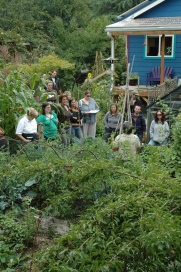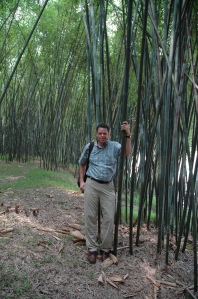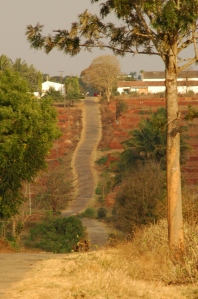 My interdisciplinary teaching, research and collaboration includes many themes of Social Work, social change and sustainable living innovations. I tend to engage in projects of food security and sustainable agriculture / agroforestry methods, appropriate technology applications, innovative business and economic development, and efforts of community resilience via disaster preparedness and response systems and communications.
My interdisciplinary teaching, research and collaboration includes many themes of Social Work, social change and sustainable living innovations. I tend to engage in projects of food security and sustainable agriculture / agroforestry methods, appropriate technology applications, innovative business and economic development, and efforts of community resilience via disaster preparedness and response systems and communications.
Within the profession of Social Work, I was among a handful of early thinkers in the mid-1980s (first as a student and then as faculty / practitioner) who began to speak and act in ways which connected Social Work with practical topics of ecological restoration, sustainable living / resilience, and environmental justice (among others). Back then, Social Work colleagues and elders often expressed dismay or ironic disdain about these interests / imperatives, yet we persisted. Subsequent expansion of Ecological Systems Theory to include natural environment spheres served to broaden, strengthen and affirm the practical value of social work in the 21st Century. “Eco-social work” emerged as the preferred term of this domain of focus, rather than subsequent references to “green social work.” I prefer and commonly use references to eco- or sustainable social work, providing that we clarify what we aim to sustain.
Fast forwarding 30 years, I am heartened by the wave of SW professionals, young and old, who have “connected the dots” and committed actions (whether on campuses, in organizations, or in communities) to highlight the interactive relevancies across micro, mezzo and macro practices realms. I am proud to have played a part in preparing the foundation for this critical eco-social work frontier. Much remains to done, including candid and inclusive discussions about what is being sustained, by whom, and to what ends.
Hence, my bias for this site and my career has been towards practical applications that position Social Workers (and all people) to be equipped with skills and perspectives for “successful living” — demonstrations of interdependent resource self-reliance, education system designs with maximal value and minimal debt, robust community service, social / ecological welfare and justice — and so part of the collaborative solution to such challenges. I recommend reading the work of Jack Alpert for perspective on why doing so matters.
—
From 1998 to 2015, I proudly served as Core Faculty and various leadership positions, including the Dean of undergraduate and graduate liberal and professional studies, at Antioch University Seattle. In 2015, I decided to pursue new opportunities, including new international teaching and research pursuits, further writing and perhaps another film.
I currently serve as Contributing Faculty and Subject Matter Expert for the Social Work PhD / DSW program at Walden University — a fine institution with an impressive social change mission, talented faculty and staff colleagues, and great students! I am proud of all of my students over the years, all of whom are pursuing impressive careers of social benefit and some having continued their academic studies to complete their doctoral degrees.
In 2016, I was the recipient of a Fulbright Scholar Specialist award in Social Work, and collaborated with faculty at Makerere University, in Kampala, Uganda, focusing on new social work graduate program and regional professional development initiatives. While there, I encouraged new collaborations for practical bamboo resources to address critical issues of poverty, unemployment, and social welfare across Uganda and East Africa — initiative that has become the programs of Bamboo for Good (B4G).
 As mentioned above, I have been exploring and leading so-called “eco-social work” or even “green social work” practices since the late 1980s. I hold degrees in Social Work from the University of Tennessee (Ph.D.), University of Pittsburgh (M.S.W.) and West Chester University of Pennsylvania (B.A.) and an A.A.S. degree in Human Services from Montgomery County Community College of Pennsylvania – and am proud to be associated with each of these institutions.
As mentioned above, I have been exploring and leading so-called “eco-social work” or even “green social work” practices since the late 1980s. I hold degrees in Social Work from the University of Tennessee (Ph.D.), University of Pittsburgh (M.S.W.) and West Chester University of Pennsylvania (B.A.) and an A.A.S. degree in Human Services from Montgomery County Community College of Pennsylvania – and am proud to be associated with each of these institutions.
My doctoral dissertation, Living Responsibly: A Study of Sustainable Living in East Tennessee and the Southern Appalachian Bioregion (University of Tennessee, 1997), was an early published research contribution to the Social Work literature focusing on environmental and sustainability topics. My study examined sustainable homesteads, communities and businesses, and focused on the experiences of people, living in both rural and urban settings, who endeavored to live and work in ways they considered to be more socially and environmentally sustainable. Themes, theories and practices of food systems, food security and sustainable agriculture, renewable energies, natural building and construction, healthy community relations and conflict resolution, sustainable business and economic development, among others were explored.
 In 2006/07, I completed an externally-funded sabbatical as Visiting Foreign Faculty at Zhejiang Agriculture & Forestry University, in Linan County, China, teaching graduate courses on themes of sustainable community development, ecological design and pursuing collaborative, provincial government / grant-funded research on social, economic and environmental contexts of sustainable bamboo resource systems. Why bamboo?
In 2006/07, I completed an externally-funded sabbatical as Visiting Foreign Faculty at Zhejiang Agriculture & Forestry University, in Linan County, China, teaching graduate courses on themes of sustainable community development, ecological design and pursuing collaborative, provincial government / grant-funded research on social, economic and environmental contexts of sustainable bamboo resource systems. Why bamboo?
Over August | September 2004, and February | March, 2006, I traveled with my wife, Michelle, to India to facilitate exciting organic agriculture and permaculture design workshops. These events occurred at the direct invitation of Professor Samdhong Rinpoche, then Prime Minister of the Tibetan Government in Exile, and were collaborative projects with Lobsang Tsering, a Tibetan Fulbright / Brandeis University graduate student who studied permaculture design and other themes of sustainable community development with me.
 Convened in Bylukuppe and Kollegal Settlements, Karnataka State, the workshops aimed to extend efforts underway by the Tibetan government towards organic agricultural practices within the Tibetan settlements, home to some 130,000 Tibetan refugees since 1959. The training served participants representing 12 agriculture settlements across six states in India, including farmers, settlement officers, cooperative members, project secretaries, and agriculture extension officers. I was invited by the Prime Minister to return for a third collaboration in July, 2009.
Convened in Bylukuppe and Kollegal Settlements, Karnataka State, the workshops aimed to extend efforts underway by the Tibetan government towards organic agricultural practices within the Tibetan settlements, home to some 130,000 Tibetan refugees since 1959. The training served participants representing 12 agriculture settlements across six states in India, including farmers, settlement officers, cooperative members, project secretaries, and agriculture extension officers. I was invited by the Prime Minister to return for a third collaboration in July, 2009.
Watch the documentary film about this collaboration – Sustainability in Exile: Tibetan farmers cultivating compassion
In 2004, I founded Pacific Bamboo Resources (PBR), a research and development institute supporting international and domestic bamboo conservation, cultivation and integrated resource systems for rural and urban sustainable community development. Here is a link to a video, produced by Al Gore’s Climate Reality Project, which showcases our bamboo project in Kenya, a partnership project of Pacific Bamboo Resources, Waterstone and Green Belt Movement. Thanks to Lennox Foundation, we have been operating on funding of $71k awarded in 2013, $98k awarded in 2014, and another $98k awarded in 2015. Building on this work, new collaborations are advancing Bamboo for Good (B4G)! including 2017 funding for bamboo propagation, community engagement and habitat conservation partnerships in/around the Mghinga Gorilla National Park in southwest Uganda.
In past, PBR created and collavboratively supported Morethana Farm, a 6-acre organic farmstead in the Sammamish Valley of Washington, showcasing practical sustainable agriculture methods, onsite biochar production and education, and academic – community collaborations. From 2011-2016, we raised over $50k to support projects and programs on the farm. Check out this video describing an early phase of our farmstead programs.
To extend my interest in and support for advancing sustainable bamboo resources, I presently serve on the Alternative Natural Fiber Technical Committee for the Rainforest Alliance. Similar to how Forest Stewardship Council (FSC) certification collaboratively safeguards the sustainability of forests, this effort aims to inform responsible management of alternative natural fibers (including bamboo) in collaboration with industries and businesses using these materials, while seeking verification and support for globally respected social, economic and environmental criteria. Go here for more information:
http://www.rainforest-alliance.org/agriculture/standards/alternative-natural-fibers
Looking back, in May, 2005, I traveled to China to meet with government officials, academics, entrepreneurs and community leaders of Zhejiang and Guangdong Provinces, involved in and committed to sustainable bamboo projects and enterprises.
 Following my sabbatical in 2006, I was invited back to China in November, 2007 to deliver a keynote address for the International Conference on Bamboo and related Hangzhou Bamboo Shoot Festival in Lin’an City, Zhejiang Province. Additional networks in Bangladesh, Ecuador, Hawaii, India, Indonesia, Japan, Philippines, Vietnam, and mainland U.S. (and elsewhere) afford PBR with access to in-country data, perspective and collaborations.
Following my sabbatical in 2006, I was invited back to China in November, 2007 to deliver a keynote address for the International Conference on Bamboo and related Hangzhou Bamboo Shoot Festival in Lin’an City, Zhejiang Province. Additional networks in Bangladesh, Ecuador, Hawaii, India, Indonesia, Japan, Philippines, Vietnam, and mainland U.S. (and elsewhere) afford PBR with access to in-country data, perspective and collaborations.
In March 2009, the Buckminster Fuller Institute announced that PBR was among thirty-three outstanding international finalists for the prestigious Buckminster Fuller Challenge, a $100k award for distinctive and timely design proposals for social, economic and environmental change and sustainability. I led the PBR team which submitted A Proposal for Bamboo Resource Systems for Social, Economic and Environmental Benefits in the Pacific Northwest USA.
As a United States Peace Corps Volunteer in Kingston, Jamaica (1991-93), my primary assignment within the Community Development Sector had me serve as Director of Family & Research Services for VOUCH, Limited: A Voluntary Organization for Uplifting Children. As a secondary assignment, I taught undergraduate Social Work courses and supervised field practicum projects through the Department of Social Work at the University of the West Indies, Mona Campus. Now a Returned PCV, I am a supporter of the National Peace Corps Association. BTW, I highly recommend viewing the film Life and Debt, which vividly documents the challenges, hardship, and perseverance of Jamaicans in face of harsh economic impositions rendered by the International Monetary Fund (IMF), World Bank, Inter-American Development Bank (IADB), and the World Trade Organization (WTO).
Over the years, I have also fed my entrepreneurial spirit with a few innovative pursuits. First, in 2000, I founded ScherchLight Designs, LLC, featuring a variety of (early technology) ultra-efficient, durable, and long-life LED lighting technologies (which are ubiquitous today), and later co-founded Living Systems Design, LLC, providing low-impact integrated water management services — two ventures which allowed me (and others) to deliver (and learn much about) social, economic and environmental benefits of sustainable business development, management and networking via technological innovation.
I also served as a co-founder and Executive Vice President for Resource Fiber LLC, introducing the first domestic bamboo industry to the US and creating new educational, employment and economic opportunities beginning in the Black Belt region of Alabama. Go here for more information:
In complement to my other pursuits, 2020 marks 30 years of my avid engagement with the global amateur radio community. Having earned Novice, General and Advanced Class amateur radio licenses in 1990 (KK7PW), I earned the top Amateur Extra Class license in March, 2010. I am also active in preparing and teaching amateur radio training courses and am an accredited Volunteer Examiner (VE) to support testing sessions for new radio hams. I also hold licenses in Japan (JO4FND), Rwanda (9X0SS), and Uganda (5X1O).
Over the years, I have met ham operators from all over the world (complementing my travels and professional field work) and subsequently have learned much from them about their cultures, communities, professional pursuits and shared interests in sustainability and appropriate technologies — typically explored over fantastic meals. 🙂
BTW, IMHO (in my humble opinion), amateur radio knowledge, skills and credentials are excellent complements to a formal interdisciplinary education, afford cross-cultural awareness and relationships, and are valuable to individual sustainable living and community development efforts. And, its fun! 🙂 I encourage you (yes, you!) to get your license! Read my 2014 paper:
There’s Something in the Air: Amateur Radio and its Contributions to International Sustainable Community Development
http://ijspp.cgpublisher.com/product/pub.274/prod.19
I have been and/or am currently a member of the University of Pittsburgh Panther Amateur Radio Club, the University of Tennessee Amateur Radio Club, the Western Washington DX Club (WWDC), the West Seattle Amateur Radio Club (WSARC) — currently a WSARC board member, the China Radio Sport Association, and the American Radio Relay League (ARRL).
I now volunteer for the Disaster Communications Team of the American Red Cross serving King & Kitsap Counties, WA, and the Auxiliary Communications Service, an affiliate program of the King County Amateur Radio Emergency Service (ARES) and the Division of Emergency Management for the City of Seattle.
I monitor many of the HF, VHF, and UHF bands (all with 100% solar power!) and can be frequently found on the 20 meter band, on or around 14.280MHz and many 2-meter & 70-centimeter northwest repeaters including WW7SEA, W7AW, W7VHY of the Puget Sound Repeater Group. And, via Echolink. Give me a call when you can! 73
~~~~~~~~~~~~~~~~~~~~~
BTW, I presently contribute my carbon-neutral computer processor capacity to e-research projects of the World Community Grid and Climateprediction.net via use of BOINC, the open-source software of the Berkeley Open Infrastructure for Network Computing. Please consider joining and contributing your excess computer resources as well (**Antioch University students, alumni, faculty and staff — join the Antioch University Team and lend a hand . . . or, some band-width).
I maintain this website from my home using computers and a TP-Link AC1750 WiFi B/G/N router all running on 100% solar power.
Cheers!
